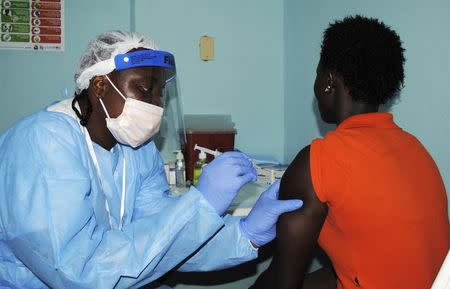Sierra Leone hopes for economic bounce post-Ebola

By Karin Strohecker LONDON (Reuters) - Sierra Leone could see growth rebound to double digits over the next 3-5 years as it emerges from the Ebola crisis and plans to tap its diaspora to raise funds for development, its foreign minister said. The west African country's economy was ravaged by the recent year-long outbreak of the Ebola virus that killed more than 9,000 people across Sierra Leone, Guinea and Liberia. Its key mining and agricultural sectors were decimated and local trade and international transport ground to a halt. "At the moment because of Ebola, we are back in the single digits, but we will get back up again ... we will get back into the double digits," Foreign Minister Samura Kamara told Reuters on the sidelines of an investor meeting in London. Before the Ebola outbreak, the government forecast that 2014 gross domestic product (GDP) would grow by 11.5 percent. The World Bank now expects 4 percent for 2014 and -2.0 percent this year. Much of the recent growth has been driven by the mining sector, which makes up 16 percent of GDP and had taken a double hit from the virus outbreak and the drop in commodity prices. Looking ahead, Kamara said growth would be fuelled by small businesses and farming returning to normal as trade and travel restrictions are lifted. He also saw a recovery in mining, albeit a challenging one given the slower demand and lower prices. He added that Sierra Leone could also enlist its countrymen living abroad to help raise funds to rebuild the country, though more effort was needed to lay the groundwork. "(By) 2018, hopefully we should be able to issue diaspora bonds," he said. Speaking ahead of an international conference in March focussing on rebuilding the three west African countries, Kamara said rebuilding efforts should be centred around consolidating the healthcare sector, which had been on its knees even before the outbreak, and boosting education. "In the healthcare sector, we need to preserve knowledge, but also equipment," he said. Kamara, one of eight candidates short-listed to become the next president of the African Development Bank (AfDB), said he would focus the organisation's efforts on boosting infrastructure development and regional integration. The new AfDB president will be elected by its board of governors on May 28 and take over from Rwandan national Donald Kaberuka, who has been in office since 2005. (Editing by Tom Heneghan)

